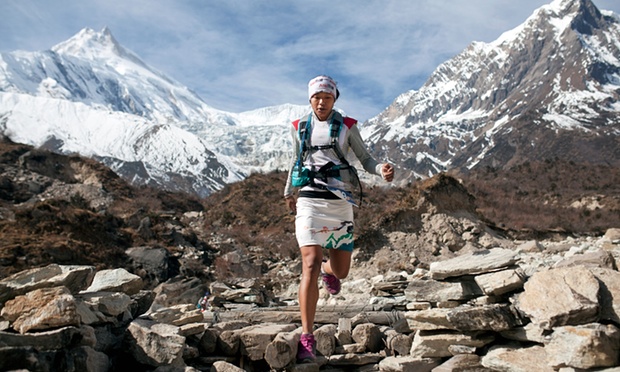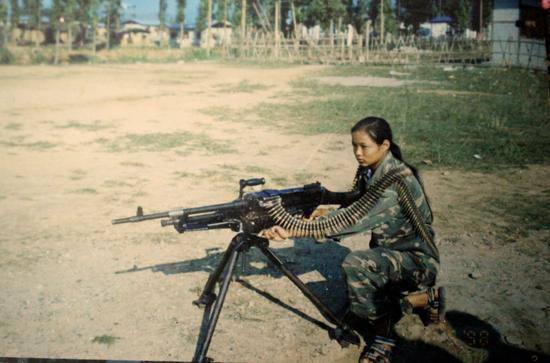The former child soldier turned star athlete blazing a trail for women in Nepal
KATHMANDU: Mira Rai is a low-profile type of national hero. When she walked through Nepal’s crowded international airport last week, no one made much of a fuss. On the streets of Kathmandu, the south Asian nation’s capital, more people notice the brightly coloured, brand new sports clothes than the slight 25-year-old who wears them.
The anonymity may not last long. Eighteen months ago, Rai was just another young Nepalese from a desperately village who grew up never sure of two, let alone three meals in a day. Now the former Maoist child soldier is winning international races in one of the world’s toughest sports – races of 50km-100km over mountains – and may be on her way to global stardom.
Rai faces her greatest challenge yet: inspiring the women of Nepal to fight back against the deep conservatism in the country and “follow their destiny” as she puts it.
I want women and girls in villages like mine to have opportunities. We need to change attitudes. It will not be easy “There has been some progress, but not enough,” said Rai. “I want women and girls in remote villages like mine to have opportunities. We need to change attitudes. It will not be easy.”
The athlete’s life has been intertwined with the chaotic and uncertain recent history of her country. Nepal is one of the world’s poorest nations, with development undermined by repeated natural disasters, such as the devastating earthquake in April, which killed 9,000, followed by a second one in May, and chronic political instability.
It was a time of war, as well as crushing poverty. In 1995, Maoist guerillas had launched an insurgency against government security forces and the incompetent, corrupt monarchy they protected. Their aim was to overturn the established order and create a new, more equal society. But it was a bitter, brutal conflict that drew in tens of thousands of children before a truce was declared in 2006.
Rai was in her early teens when the Maoist recruiters came to her village. “I was inspired by their message of making a better society here, especially for women, and by the adventure too,” she recalled. “Other girls were confined to their homes and I thought if I go then the others will follow.”
A part-time fighter at first, she eventually spent two years in a forest camp where she underwent weapons training and ideological instruction.
Rai was prepared to fight and to die in the struggle. But it was sport that she enjoyed most, first martial arts taught by an instructor in the guerrillas’ camp, and then running. When peace came, many Maoist fighters were incorporated into a new national army but Rai, deemed a child combatant by the United Nations, which oversaw the transition process, was rejected. “I went home, and studied. But I kept running, by myself, every day,” she said.
Last year, friends in Kathmandu persuaded her to enter a 50km race over hills up to 2,600m near the city. Several such races are held every year in Nepal, often in remote areas at high altitude, and attract international runners to the nation’s stunning Himalayan landscapes.
Rai had never run such a distance and was the only woman to take part. But, with the help of a friend who bought her noodles and fruit juice as she faded towards its end, she finished.
“I had no idea,” she said. “I had no food or fluid. But I knew I could do it. I had to do it.”
This year she was better prepared, having run a series of major races in Nepal, in Hong Kong, and two in Italy last autumn. The summer season saw Rai’s entry on the international stage proper, with races in Italy, Spain, New Zealand and the US and a major win in France in an 80km race around Mont Blanc in April. In her most recent race, in Spain, she came second, winning €1,000 in prize money, almost double the average annual per capita income in her homeland.
Her earnings have allowed her younger siblings to go to school, and her parents to be free, for the first time in their lives, from worrying about where the next meal will come from. “They have always supported me. I owe them so much,” Rai, now resting and training before the next competitions, said.
I had no idea. I had no food or fluid. But I knew I could do it. I had to do it
There is little help for sportsmen, and still less for sportswomen, in Nepal. A group of dedicated enthusiasts have crowdsourced funding for Rai and a tiny small band of local athletes.
Rai now has a small sponsorship deal with a French sports equipment brand, which gives her some clothes and gear. But her primary motivation is not money. It remains inspiring other women to follow her own unorthodox footsteps in Nepal, and something more personal. “I just love running,” Rai said. “I’d do it anyway. I love it.”
(Editor’s Note: If you have also done something, which other people could learn and replicate, we are happy to feature your stories. Please contact us at editor@nepalekhabar.com. Source of Story: The guardian)


